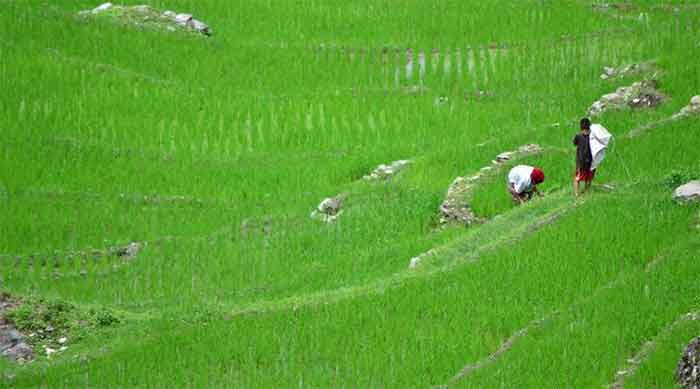
Keeping in view the importance of checking climate change , all sectors must contribute to he reduction of greenhouse gas emissions. In this context the extremely important contribution which the food and agriculture sector can make was underestimated initially but more and more research is now indicating that the contribution of this sector can extremely important. In fact if all the potential of this sector is more or less fully tapped, then this sector can perhaps make the most important contribution to the most crucial task of checking climate change.
In a study titled ‘The Great Climate Robbery’ GRAIN, a reputed international organization working on small farmers and sustainable farming based on them has written, “ The expansion of unsustainable agricultural practices over the past century has led to the destruction of between 30 per cent and 75 per cent of the organic matter on arable lands, and 50 per cent of the organic matter on pastures and prairies. This massive loss of organic matter is responsible for between 25 per cent and 40 per cent of the current excess carbon dioxide in the earth’s atmosphere.”
On the plus side this study points out that this damage can be undone substantially “ simply by restoring the practices small farmers have been engaging in for generations. If the right policies and incentives were in place worldwide, soil organic matter contents could be restored to pre-industrial agriculture levels within a period of 50 years…This would offset between 24 per cent and 30 per cent of all current global greenhouse gas emissions.”
This study emphasizes that farmers can maintain their present yields while giving up chemical fertilizers by using agro-ecology, a fact confirmed by the International Assessment of Agricultural Knowledge, Science and Technology for Development (IAASTD).—a three year intergovernmental process involving more than 400 scientists. The International Panel for Climate Change has estimated that for every 100 kg. of nitrogen fertilizer applied in the soil, one kg. ends up in the atmosphere as nitrous oxide, a gas that is 300 times more potent than carbon dioxide as a greenhouse gas and is the world’s most significant ozone depleting substance. The GRAIN study also pointed out that supply of natural gas for nitrogen fertilser may now rely more on fracked wells, which leak about 50 per cent more methane gas compared to conventional natural gas wells. Methane is 25 times more potent than carbon dioxide as a greenhouse gas. So the prospects of educing GHG emissions just by shifting to agro-ecology rom chemical fertilisers is immense, but there are so many other aspects of changing food and agriculture system to reduce GHG emissions.
By ensuring food consumption close to food production and by reducing miles travelled by food, by cutting down on wasteful processing and packaging, again there can be a big reduction of GHG emissions. A big reduction of chemical pesticides and herbicides has been demanded time again for so many other reasons including health and safety above all ,but in addition this will also help significantly in reducing GHG emissions.
GHG emissions are known to be very high in the big plantations and livestock operations taken up by giant agro-business corporations and GHG reductions can be reduced by meeting food needs from other sources and redistributing the huge land holdings of these big operators among landless and near landless peasants and farm workers.
There are numerous creative ways of reducing GHG emissions in food and farming system, and in these very important efforts we can learn a lot from traditional farming wisdom. Traditional farming methods had been able to maintain and enhance soil organic matter for several centuries while industrial extractive farming systems have depleted soil organic matter very rapidly. Hence there is much to learn from traditional farming methods in this and related contexts.
Bharat Dogra is a journalist and author. His recent books include Man Over Machine and Protecting Earth for Children.
IF YOU LIKED THE ARTICLE SUPPORT PEOPLE’S JOURNALISM
Related posts:
Related posts:
Views: 0
 RSS Feed
RSS Feed

















 January 2nd, 2021
January 2nd, 2021  Awake Goy
Awake Goy  Posted in
Posted in  Tags:
Tags: 
















